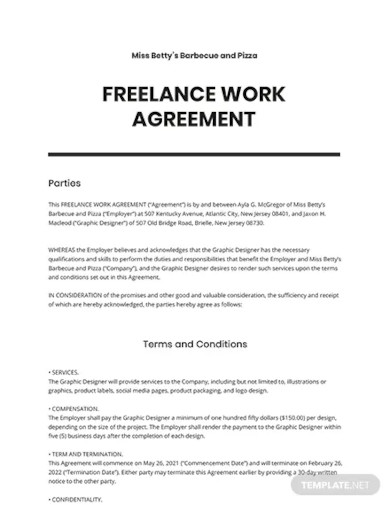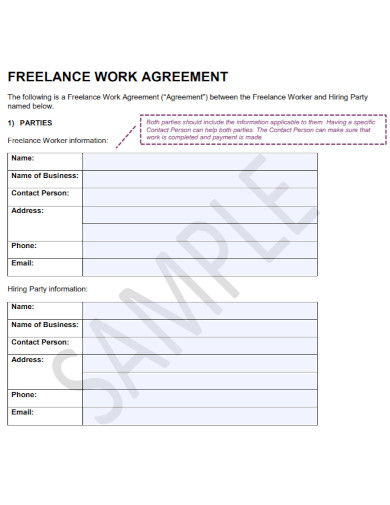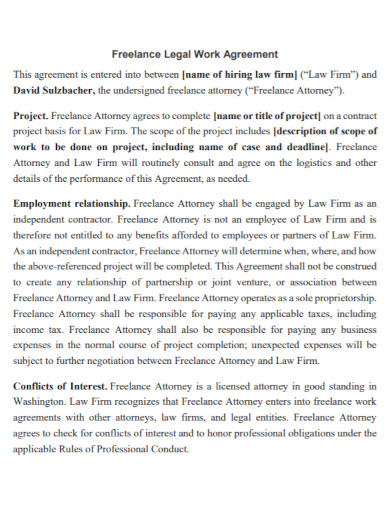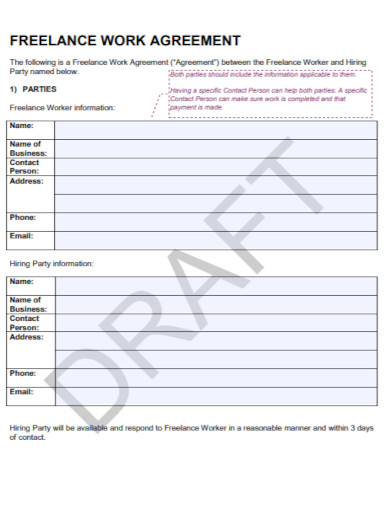3+ Freelance Work Agreement Examples
Working as your own boss is what other employees often dream of becoming one day, and this would either be from hard work or by making your own experience a business that others may want to hire you. The fact that you settle with your own terms, your own time and your own expertise. Anyone in any company can hire you for a project based type of work but your terms and time are also going to be discussed with them. Some freelance workers would prefer this than to have to work in a prepared schedule, and it goes without saying, being your own boss and working hours you prefer is sometimes easier. For those who do work as freelance workers, there are companies who may hire you for your expertise, but it is not smooth sailing from there. Just like any other kind of work, there should always be a work agreement between parties. Check out the following below for more ideas and tips on a freelance work agreement.
3+ Freelance Work Agreement Examples
1. Freelance Work Agreement Template

2. General Freelance Work Agreement
3. Freelance Legal Work Agreement
4. Draft Freelance Work Agreement
What Is a Freelance Work Agreement?
What is a freelance work agreement? A freelance work agreement is a document that states the working terms between the freelancer and the person or the company who is hiring them for their services. This work agreement consists of the terms and conditions, the time frame for the job, the type of work they are hiring the freelancer for and the payment or the salary for the freelancer. Since every freelance work agreement differs, what may be written down in the agreement also differs. The whole point of having a work agreement is to let both parties or both sides understand what should be expected between them. It gives the freelancer an idea as to what the employer wants them to do, as well as it gives the employer the idea as to what a freelancer does for the job they are hired to do. This work agreement is also a legal document just like any other agreement, and when necessary, can be used in court for complaints of the payment or salary for the freelancer.
The purpose of a freelance work agreement is the agreement between the employer and the freelancer. The agreement outlines what the job is about, the time frame for hiring the freelancer, the projects they may be working on and the payment. All of these are explained in the document as well as by the employer. Without having a work agreement, both parties may assume differently. The other party may think that the freelancer can work at this amount of time and get paid less or the employer may want the freelancer to work at this certain time and expect immediate results. To avoid such assumptions, a work agreement is set.
How to Write a Freelance Work Agreement?
You may be wondering by now as each freelance work agreement is different. What should be placed and how to make it as clear as possible? Of course there are different ways in writing out a freelance work agreement depending on the job you want the freelancer to do. You can check out the following tips below. These tips are general so they can be for any kind of work agreement you may be planning on writing out.
1. Freelancer’s Information
The most basic and most common thing to find in an agreement is the candidate or the freelancer’s general information. This is necessary as this helps just in case you may want something to add or to get an update on the freelancer. It is also easier for the employer to reach out if the information is complete.
2. Time Frame
Stating the time frame for the whole operation is also important. It is the responsibility of the employer to write down the time frame of the whole job and how long or how short they are planning on hiring the freelancer. The purpose of this is to let the freelancer understand or to let them know that they are only hired at this certain amount of months, weeks or days. Be specific enough for both parties to know.
3. Kind of Project
What kind of project are you hiring them for? Make it as specific as possible. This helps the freelancer know before they would agree to any kind of agreement contract from you.
4. Duplicate Copies
One copy for you and one copy for your freelancer. This way, if there are any issues concerning the agreement, both parties are able to discuss about it. This is also better so that any issues or problems can be resolved without it getting worse.
5. Payments
The employer must state the mode of payment and the dates of when the freelancer may be paid. This is important to discuss with the freelancer and the employer to make sure that both parties are in agreement of the mode of payment, the amount to be paid and any compensation if the employer states of it.
FAQs
What is a freelance work agreement?
A document that explains the work, the terms and conditions, the payments and the overall job of a freelancer when hired by a company for their expertise.
Why is it so necessary for a freelance work agreement?
Regardless of what kind of employment, a work agreement, especially a freelance work agreement is still necessary. As this explains the necessary things to both parties. A freelance work agreement may be different from a normal agreement contract, but it still holds the same weight as a regular work agreement. It explains to the freelancer the kind of job they are hired to do, the payment and the time frame for the job.
What happens if the freelancer is done with the contract but the employer has not paid?
If the freelancer is done with the contract and the employer refuses to pay, even if it is stated in the contract, the freelancer may take it to court.
Freelancing jobs make some people’s lives easier. They are their own boss, they can choose what job they wish to get hired too and the times they may want to work. But when they are hired by a company, they must also follow the rules and guidelines stated in their contract. The work agreement’s purpose is to give the freelancer enough understanding as to what kind of work or project they are being hired to and the time frame to work on it.





